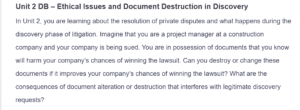Unit 2 DB – Ethical Issues and Document Destruction in Discovery
In Unit 2, you are learning about the resolution of private disputes and what happens during the discovery phase of litigation. Imagine that you are a project manager at a construction company and your company is being sued. You are in possession of documents that you know will harm your company’s chances of winning the lawsuit. Can you destroy or change these documents if it improves your company’s chances of winning the lawsuit? What are the consequences of document alteration or destruction that interferes with legitimate discovery requests?
As a project manager, I would not destroy or alter the documents that may harm the company’s chances of winning litigation. These actions are unethical and could introduce greater trouble for my career as an individual (Tanford, 2002). One of the most common values that a company subscribes to includes honesty and integrity. These values should be carried down to all the activities that involve the company. Such activities that include litigations should not provide an opportunity for dishonesty and lack of integrity.
In addition, the destruction of such critical documents may cause the company more harm than good. Upon learning of destruction of documents, a jury infers that these were harmful to the case. Therefore, they could impose sanctions on the company and penalties (Legal Ethics and the Destruction of Evidence, 1979). In worst-case scenarios, the company may be found liable without a fair trial. Courts tend to give a harsher ruling to defendants who intentionally destroy information, hoping to tilt the outcome in their favor. However, the courts consider various factors that determine whether a missing document would add value to the case.
Documents that have no effect on the case cannot lead to sanctions even after destruction. The amount of effect that the destruction or alteration of the documents has on the judicial process is also considered (Walker & McCurdy, 2012). Such aspects guide the court in determining the most appropriate sanction.
As the company’s project manager, I am obligated to preserve documents in their original form. This obligation occurs before and during the litigation process. However, the defendant may be allowed to destroy documents after informing the court and the plaintiff. Seeking this permission allows the plaintiff to review the documents in question. In this particular case, the company would be charged with negligent destruction or alteration of evidence (FindLaw, 2018).
References
FindLaw. (2018). Delete At Your Peril: Preserving Electronic Evidence During The Litigation Process.
Legal Ethics and the Destruction of Evidence. (1979). The Yale Law Journal, 1665-1688.
Tanford, J. A. (2002). The Ethics of Evidence.
Walker, C. A., & McCurdy, M. (2012). The Danger of Destroying Documents When the Possibility of Litigation Arises.
ORDER A PLAGIARISM-FREE PAPER HERE
We’ll write everything from scratch
Question
Unit 2 DB – Ethical Issues and Document Destruction in Discovery
In Unit 2, you are learning about the resolution of private disputes and what happens during the discovery phase of litigation.

Unit 2 DB – Ethical Issues and Document Destruction in Discovery
Imagine that you are a project manager at a construction company and your company is being sued. You are in possession of documents that you know will harm your company’s chances of winning the lawsuit. Can you destroy or change these documents if it improves your company’s chances of winning the lawsuit? What are the consequences of document alteration or destruction that interferes with legitimate discovery requests?


